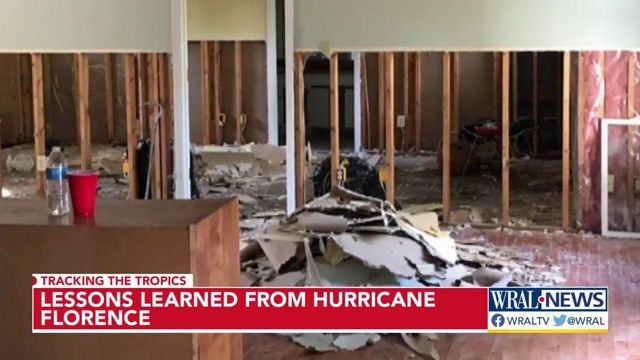How to prepare for a flood: Flooding lessons learned from Florence
Hurricane history has taught us that a tropical system moving through North Carolina can be devastating for anyone – no matter how far inland you live.
One woman learned this lesson personally when Florence flooded her home, destroying 75% of her belongings.
"It seems silly," said Barbara Pilcher, "But you think, 'Where's that recipe? Oh yeah, Florence took it.'"
Like a thief, Florence ransacked almost everything she owned.
"When you walk into your house and it smells, it's shocking," said Pilcher.
Lesson one: Salvage your belongings quickly
The first lesson she learned: Work fast to get everything out of your flooded home, and salvage what you can.
She and her family had attempted to protect their possessions before they fled Florence – setting precious items up high, where they thought they would be safe.
"But that's not always the case – because once the bottom of a wall weakens, then shelves and things can fall down," said Pilcher. "Furniture can start floating and knock over other things."
Lesson two: Make sure you aren't overcharged for repairs
Once they got everything out, the next ordeal began: Repairs.
It was stressful, she said, allowing strangers in your home during such a vulnerable time, and trusting them to try and fix and save your home.
"You just take your chances," said Pilcher. "You have to be your own advocate. You have to watch everything that's being done."
Pilcher visited her home every single day while it was being repaired – to watch progress, and keep an eye on invoices so she'd know what they were being charged as costs added up.
Lesson three: Make sure your flood insurance covers belongings
Another takeaway from Pilcher: Make sure you have the right insurance coverage.
Since Pilcher lives in a flood plain, they already had flood insurance. However, they did not add coverage for contents, such as clothes, furniture and appliances.
"We opted out because we thought, 'It's never going to get that bad,'" she said. "Surprise."
It's a surprise no one wants. So prepare ahead as hurricane season begins.
North Carolinians should know these important facts about flooding
- We all live in a flood zone: Seemingly calm creeks can turn into raging rivers within hours, and you don't have to live near a waterway to be flooded. Flooding can be caused by storms, melting snow or drainage system back-ups. About 25% of all flood insurance claims come from areas labeled low risk.
- Flood insurance is affordable and easy to get: A policy to cover a $250,000 home and its contents costs less than $400 a year. The average cost of damage from a couple inches of water is $8,000 to $10,000. Renters also need separate flood insurance to cover their belongings.
- Take household inventory: Go through your home, and take pictures or video of all your furniture and valuables. Store the documents somewhere other than your home.
- Flood insurance has a 30-day waiting period: Don't want until it's too late to buy flood insurance. There is a 30-day waiting period from the time of purchase until the policy takes effect.
- Basic rule of insurance coverage: Homeowners and renters insurance covers damage caused by falling water (i.e. rain or snow). However, rising water (i.e., flooding) is not covered under most plans.












